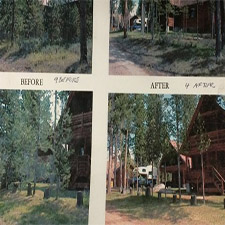A "Social-Impact Network" for Wildfire Adaptation
In the face of natural hazards, resource scarcity, climate change, and other social-ecological challenges, how does a community adapt, and how can communities combine forces to contribute to transformational change? Dr Bruce Goldstein, an associate professor in Environmental Design and Environmental Studies and core faculty at the Center for Science and Technology Policy Research (CSTPR) at the University of Colorado Boulder, takes on this pressing question.
Goldstein sees communities as the engine for institutional transformation. By organizing themselves into “learning networks,” communities can apply local knowledge to address issues that are very specific to their place and time, and team together to transform unstable practices into sustainable ones. Learning networks enable people to create new ideas by serving as a laboratory for best practices, and a forum for addressing basic questions like, “What is the system in which I live and how do I want to change it?”
Goldstein has been studying a Forest Service – Nature Conservancy initiative called the “Fire Learning Network” since 2006; however, communities were never a large part of this conversation, and they are a critical part of reforming how we address wildfire. Beginning in 2013, Goldstein began studying a new learning network, the Fire Adapted Communities Learning Network (FACNET), which is aimed at connecting communities from across the United States in order to solve complex issues associated with wildfire adaptation. Membership is diverse, including city fire departments, state forest services, fire councils, Native American tribes, scientists, and various other individuals.
Goldstein leads his CSTPR-based research group in studying FACNET, including interviewing stakeholders in FACNET communities to determine the cultural, political, social, and ecological context of fire adaptation, and attending meetings between FACNET members in Ashland, OR who seek to exchange ideas and foster collaboration across their communities. The project has built trust and shared understanding, beginning over ten years ago when it began studying the U.S. Fire Learning Network. Its aim is to enhance our insight into the network through constant interaction and exchange with the netweavers, applying a participatory action research approach, and learning together in ways that enhance their ability to adapt their network design.
For more information visit Goldstein’s lab website, or the Fire Adapted Communities Learning Network website.

